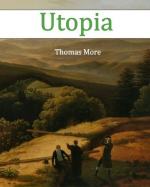|
This section contains 3,559 words (approx. 12 pages at 300 words per page) |

|
SOURCE: “Melville and the Tradition of Primitive Utopia,” in JGE: The Journal of General Education, Vol. XXXIII, No. 1, Spring, 1981, pp. 6-14.
In the following essay, Beauchamp evaluates the primitive, escapist utopia of Melville's Typee.
Among the compensatory myths of political theory, before the Idea of Progress pushed all others to the periphery, three figured most significantly: the myth of the Golden Age, the concept of the Noble Savage, and the dream of utopia. Although these imaginative constructs differ to the obvious degree of each requiring its own rubric, they nevertheless interpenetrate in crucial ways and share a number of common features. Of the three, the image of utopia is the most complex, the most multi-dimensional, with the most tangled intellectual history. Those ideographs of society redeemed from the Fall and purified of the ills of the real world, which we call utopias, themselves divide dramatically into two types...
|
This section contains 3,559 words (approx. 12 pages at 300 words per page) |

|


